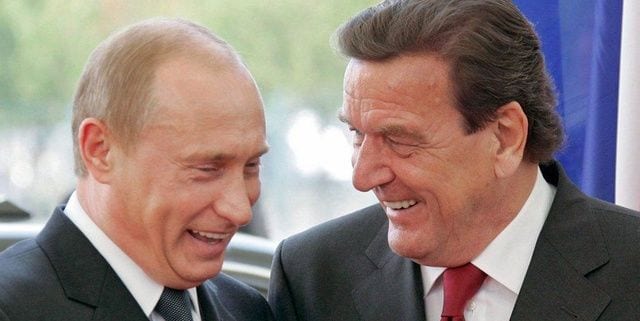On the 3rd day of May, the former German Chancellor Gerhard Schröder said in an interview with the Der Tagesspiegel newspaper about the necessity to lift the sanctions imposed against Russia for annexation of Crimea and the unleashing of war in eastern Ukraine. He reasoned his position by the fact that in the near future the world would face serious challenges related to the coronavirus pandemic, and to overcome these challenges it would be necessary to establish cooperation with all. To the fair comment of Der Tagesspiegel journalist that sanctions were a response to Russia’s aggressive policy, he called attempts to change the policy of the Russian leadership in this way senseless.
Here we should make one important reservation and note that after his resignation Mr. Schröder’s career was connected with Russian companies, which are now also on the European and American sanctions lists. Mr. Schröder is currently the Chairman of the Board of Directors of the Russian state-owned company Rosneft and the Chairman of the Board of Shareholders of Nord Stream AG, which runs the construction of the Nord Stream-2 gas pipeline. So it should be noted that neither sanctions nor the current record fall in prices for oil and other energy resources in any way affect the financial position of the management of these companies. Rosneft, despite the crisis, has not reduced performance pay to the Board of Directors for 2019, and Mr. Schröder’s fee, in particular, was USD 600 thousand.
One more important point should be taken into account: in modern Russia, the production and export of oil and other mineral resources have long ago moved from the category of business to that of a major foreign policy instrument. Rosneft, fully controlled by Russia’s top political leadership, has for years supported the criminal regime of Nicolas Maduro in Venezuela, helping to skirt sanctions. It was through Rosneft’s sham companies that Venezuela’s oil reached the international market. Now this very company is actively promoting its interests in Libya, having secured the support of the armed forces of Khalifa Haftar. The latter controls oil-rich regions of the country, where Russians are actively producing oil. In return, the Libyan commander receives Russian arms and mercenaries.
But let’s take a second glance to Mr. Schröder’s career and lobbying for Russian interests. In early 2005, even before his career termination as Chancellor, Mr. Schröder began to actively lobby for the construction of the Nord Stream gas pipeline. It is noteworthy that the signing of the construction agreement took place 10 days before the early parliamentary elections, in which Gerhard Schroeder ceded his position to Angela Merkel. Three months later, in December 2005, he took over a high position with the Russian company Gazprom, which is one of the co-founders of gas pipeline operator the Nord Stream AG (until October 2006 North European Gas Pipeline Company). Gazprom owns 51% of the shares. At the time, Mr. Schröder’s salary was EUR 250 thousand per year. And that’s just official figures, and given the opacity of business in Russia and the total corruption of top Russian officials, the unofficial income of the former chancellor could have been several times higher. It is also believed that it was Mr. Schröder who obtained permission from the Scandinavian countries to build a gas pipeline through their territorial waters.
The former Chancellor also actively promoted the idea of constructing the South Stream gas pipeline in Germany, trough the Black Sea. German business was initially skeptical about the project, but through Mr Schröder’s efforts, BASF signed a participation agreement in 2011. Although a year earlier, the German group of companies, despite pressure from its Russian partner Gazprom, said that it did not intend to participate in the project.
After the beginning of the Russian aggression against Ukraine (in 2014) and the introduction of sanctions against Russia, Mr Schröder began to actively promote the idea of their lifting, criticizing the German authorities and accusing them of playing along with US policy. In 2015, after signing the agreement on the construction of the Nord Stream-2 gas pipeline, the operator of which is Nord Stream-2 AG, a company registered in Switzerland, in which Mr Schröder becomes head of the board of directors. Although the company was registered at the end of July 2016, Gazprom did not publish this information for several months. It became known about the new appointment of Mr Schröder only in October, most likely in order not to interfere with negotiations between the former chancellor and a number of European companies, for instance, with the French Engie, which joined the project in 2017.
In the same year, another item in Mr Schröder’s portfolio was added – the Chairman of the Board of Directors of Rosneft, as already mentioned above. No one is surprised by the positions overlapping in two seemingly competitive companies (both producing oil and gas). One should not forget that these companies are fully controlled by the Russian leadership running their activities.
In recent years, however, Mr Schröder’s role in real politics has become increasingly less important. For European politicians and businessmen, the American sanctions against Nord Stream 2 have become a much stronger argument than the promises and friendly handshakes of the former chancellor and personal friend of Vladimir Putin. In addition, for 15 years since Mr Schröder’s resignation as Chancellor, new leaders have emerged in Europe (unlike Russia). But, this does not mean that Mr Schröder will no longer work off his high fees in Russian companies, relaying to the international community such important messages for the Kremlin.
source: https://democratic-europe.eu/2020/05/08/the-kremlins-chancellor/

